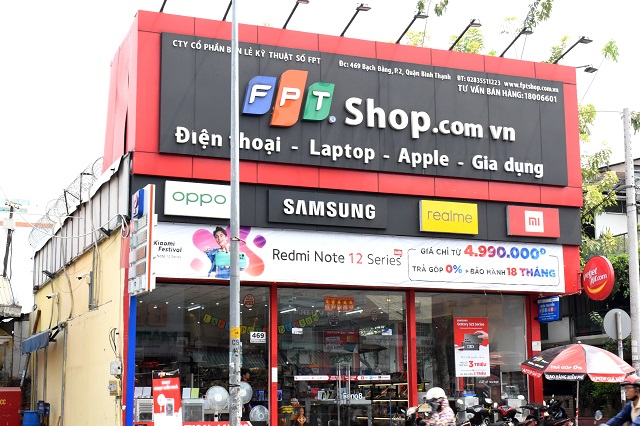 Economy
Economy

 |
| An FPTShop store on Bạch Đằng Street, Bình Thạnh District in HCM City. Photo fpt.com.vn |
HÀ NỘI Due to falling demand, communication and technology (ICT) firms had to sacrifice profits to stimulate demand as well as promote other product segments to compensate for the losses.
Harder than expected
Along with the recession of the world economy, Việt Nam is also facing many difficulties such as reduced export orders, high interest rates, and a frozen real estate market.
These factors have greatly affected income and purchasing power. Consumers now only prioritise essential items, delaying the purchase of new non-essential products such as mobile phones, laptops, computers and tablets.
In that context, many ICT retailers said that business results were not positive in the first months of the year.
Mobile World Investment Corporation (MWG) announced that its revenue in the first two months of the year decreased by 25 per cent, to VNĐ19.1 trillion (US$814 million). In which, Thế Giới Di Động and Điện Máy Xanh chains saw total revenue down by 32 per cent due to the sharp decline in purchasing power of technology products and electronics. The strongest decline was seen in the phone, tablet, laptop and television segments.
At the 2023 Annual General Meeting of Shareholders, FPT Retail's leaders also revealed that Q1 ICT revenue decreased by 20 per cent. Thanks to the pharmaceutical segment still growing by 50 per cent, the total revenue of FPT Retail stayed similar to the same period last year.
With 80 per cent of revenue coming from ICT, Digiworld (DGW) forecasts first-quarter revenue to drop by 43 per cent to VNĐ4 trillion and net profit to drop by 38 per cent to VNĐ130 billion.
After the first months of the year, Digiworld's management expects that consumer demand will be weaker than forecast. In March, the banking crisis in the US may cause inflation, causing consumption in the second half of the year to decrease. As a result, the company reduced its revenue target for 2023 by 20 per cent and profit by 50 per cent compared to the previous year, down to VNĐ20 trillion and VNĐ400 billion, respectively.
Sacrificing profits to keep market share
To overcome difficulties, businesses are flexible to offer many solutions such as increasing promotions, reducing prices to stimulate demand, stopping the open of new stores, selling more products, inventory management, and cash flow management.
At the 2023 Annual General Meeting of Shareholders, Hoàng Trung Kiên, General Director of FRT, said in the context of declining technology purchasing power, the company stopped opening new FPTShop stores and actively reduced profit margins while offering more policies and promotions to stimulate demand.
It also offered more household goods in FPTShop stores to compensate for the decrease in revenue from the ICT segment. FPT Retail's leader added that the household appliance segment in 2022 contributed 2.5 per cent to FPTShop's revenue. The company has offered household appliance products in about 300 FPTShop stores and plans to increase the number to 600 by the end of this year.
Nguyễn Bách Diệp, Chairman of the Board of Directors of FPT Retail, said that the pharmaceutical segment was also affected by the decrease in income, but medicine was an essential commodity. Therefore, the company continued to open 400 new stores to increase the number of drug stores to 1,400 this year.
Thanks to the continuous expansion, the revenue of Long Châu pharmacy chain is increasing sharply. The first quarter saw a growth of 50 per cent in revenue and for the whole year it is expected to see double-digit growth. Target profit doubled last year, reaching VNĐ100 billion.
Similarly, Mobile World Investment Corporation (MWG) also temporarily stopped opening new stores in most chains such as Thế Giới Di Động, Điện Máy Xanh, AVAKids, TopZone, An Khang, said Nguyễn Đức Tài, Chairman of the Board of Directors.
However, the Bách Hoá Xanh consumer food chain will continue to open new stores after a comprehensive restructuring in 2022.
Thus, both industry leaders MWG and FRT are quite cautious in expanding this year, focusing on promoting only essential products.
Leaders of both businesses placed great emphasis on inventory management and cash flow. With MWG, the company drastically reduced inventory to avoid the risk of price reduction as well as to reduce financial costs. The value of inventory as of the end of February decreased by about 30 per cent compared to the beginning of this year.
FRT's leaders said that the enterprise's loans were mainly short-term loans to ensure working capital. The company applied technology to optimise inventory turnover, with the goal of ensuring liquidity as well as meeting capital for the expansion of the Long Châu drug chain. FRT sets a target that each new Long Châu store opened must be profitable within six months, in order to reduce the financial burden.
As for DGW, the company's leaders said they would try to maintain growth in other segments such as office equipment (15 per cent), household appliances (65 per cent) and consumer goods (157 per cent). The company accepts to sacrifice profits to prioritise keeping market share, stabilising old sales channels and building distribution channels for new products.
At the end of last year, DGW joined two new categories of labour protection equipment and beverage with beer products such as Budweiser, Corona, Becks. Specifically, DGW co-operated with Acison Company to distribute labour protection equipment. Besides, DGW also became the exclusive distributor for AB InBev - the world's largest beer group to distribute beer products in supermarkets and convenience stores. VNS




